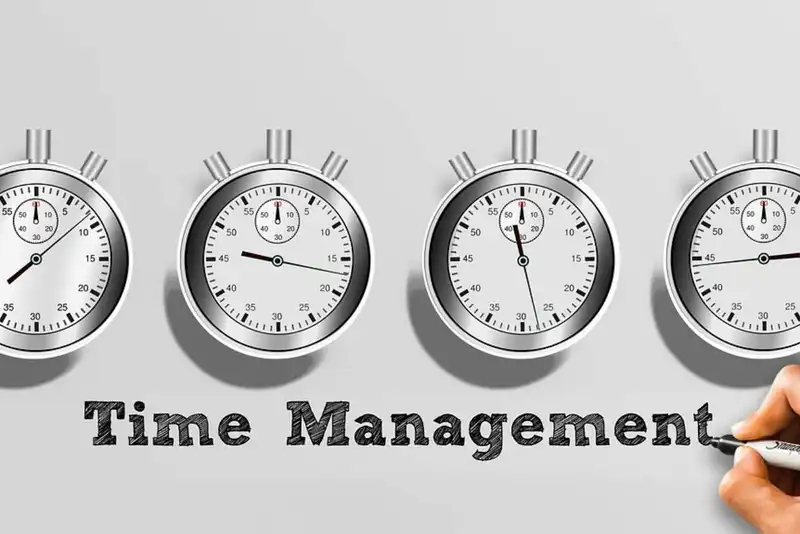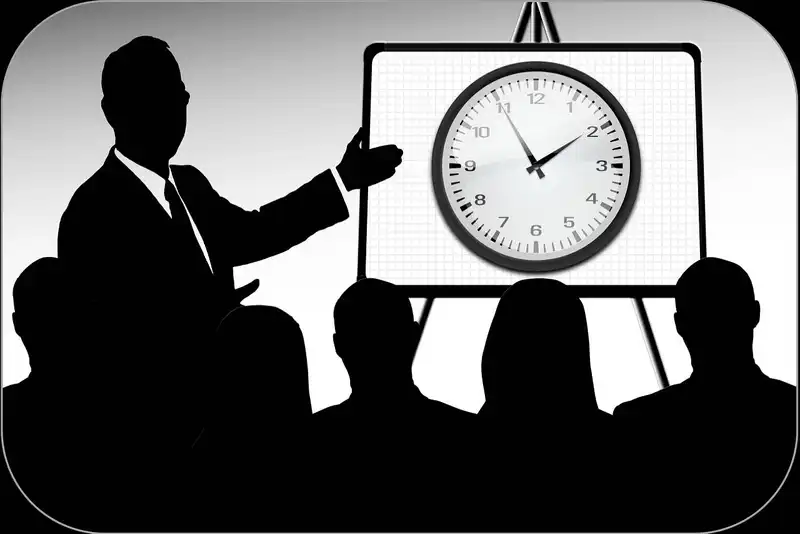What is time management ?
Time management is the process of managing time, personal productivity, and work responsibilities. It is the act of planning, organizing, and carrying out tasks.
The Best Time Management Methods to Help You Achieve Your Goals
What are the benefits of time management?
What is time management- Time management can be defined as organizing and managing your time to achieve better results in less time without much stress. Good time organization helps you schedule your time to complete your most important tasks. Good time management helps you work smarter to achieve your goals faster. Below we have listed the benefits of time management-
1. Less stress- If you can learn to complete your work in less than allotted time it can increase your confidence and reduce your stress levels. Good time management includes allocating your time to efficiently to tasks to meet deadlines. Time management also helps you be productive with the time you have so that you are not overwhelmed and tired by the work. Good time management helps you reduce stress and achieve better work life balance.
2. Greater time freedom- Time management gives you more freedom to complete important tasks. Effective time management lets you prioritize and complete important tasks in the allotted time, leaving more time to focus on things that matter to you. One of the management tips to more free time is to create a list of important tasks and allot time and then create list of things that you want to do in the time that has been freed and make an action plan for them.
3. Better focus- Effective time management starts with a to-do list which has all the important tasks and the deadlines allotted. This list gives you a point to start your work day and This improves your focus and helps you work smarter. Time management helps you focus better on your most productive activities.
4. More productivity- Time management helps you increase your productivity as you can prioritise the time spent on each task to achieve better results. Planning a daily workflow helps better your productivity. Time allocation is an important part of your management skills. Identify your daily tasks and mark which are important tasks and then spend your most productive time on them.
5. Less procrastination and distraction- You tend to procrastinate when you are not able to manage your time. Good time management can reduce procrastination and distractions. When you allocate your time for each task, you feel in control of your workload and then you won't procrastinate. Good time planning boosts your concentration and helps you focus on your goals. Effective time management has to include time boundaries which reduces causes of distraction.
What are the Effects of Poor Time Management?

When we have a lot to do and don't know when to start, we can get distracted and the work is not completed on time. Many find it difficult to manage time and end up taking on more than required work. Here are some outcomes of poor time management-
1. Poor quality of work- If you are not able to implement effective time management, you are not able toorganize the daily tasks. This can lead to procrastination and you will be trying to complete tasks at the last minute, focusing more on speed than quality. This leads to the mistakes and the quality of the work being poor.Time management can help you allot some time to check your work and reduce the number of errors.
2. Inability to meet deadlines- When you don't plan your work properly, you are not able to prioritize important tasks and end up rushing to complete the daily workflow. This can cause you to miss deadlines. Hence it is important to have good time planning to prioritize important tasks and deadlines.
3. Lack of focus- If you are not able to manage your time effectively, then you become distracted and this can lead to lack of focus on your tasks. Poor time management will lead to lack of clarity and time allocation, which leads to a person being less focused on the end goals. As work piles up due to procrastination and lack of focus, a person will ultimately start feeling the stress.
4. No time outside of work- When a person is not able to focus on work, they will not be able to meet the deadlines and hence end up working overtime. Spending that extra time on work takes time away from personal life. There is need for effective time management to be able to achieve a work life balance.
5. Fear and stress- As discussed, poor time management leads to lack of focus and inability to meet deadlines. This leads to fear of missing commitments and low self esteem. Once you start fearing your ability to meet deadline, you start stressing. Improper time management creates a downward spiral. The best way to tackle it is to identify the root cause improper time management and chart an action plan to overcome it.

Simple Employee Scheduling
Keep your workforce organized with an employee scheduling software.
Best Time Management Tools

A time management tool is used to help you organize your time efficiently. By using time management tools, you can be more productive, take better decisions and reduce the amount of time you spend on tasks. Here we have listed five tools for management of time that will left you with effective time allocation-
1. Calendar- Having a proper schedule or to-do list of the important tasks is the first step for effective time allocation. A calendar is your time management planner which helps you have better control of your time. Use your calendar to write everything that you want to do in a day right from your morning exercise and work schedule to your entertainment time. Make time blocks for the mostimportant tasks and ensure that you have no distractions. Block time for meetings and making routine phone calls and emails. Schedule a work day without any meetings, phone calls or emails to catch up on work.
2. Task manager- Task managers are part of time management apps which help you track the overall workflow make a list of tasks that need to be done, prioritize the important tasks, track the progress of work. A task manager can be list-based or Kanban-based where you create virtual boards of to-do lists and complete each board. A task manager helps you prioritize your workflow in order of importance.
3. Time tracker- Allotting time for each task is a part of time management and planning. A good time tracker can help you complete your tasks in an efficient manner. A time tracker helps you be more productive and it keeps a record of the time spent on each task. It can also analyze how you spend your time, generate custom reports for each project or client and also help you calculate profit.
4. Note taking app- A visual representation of your time management process can help you focus better. Use a note taking app for creating your short and long term goals, keep records of meeting and phone calls, your thoughts on your workflow and any tips on improving your performance. A note taking app can also help you store all your references and work documents. It also allows you to use templates for checklists, analysis and preparing roadmaps among others.
5. Other time management tools- There are many time management tools which can help you implement good time management practices. Some time management tools for building better work habits are dashboards designed to reduce distractions, website blockers and tools to automate workflow.
List the 4Ds of Time Management

The 4 Ds of time management are also referred to as 4 Ds of productivity are the four points to decide if a task is worth the time it requires. The 4 Ds help you make a decision about the task do you do it yourself or delegate or discard it.
The 4Ds can be applied to your to-do list at the start of your workday to assess which tasks can be done quickly, which can be dropped and which important tasks can be tackled later. We will now discuss the 4Ds of time management and how they can help optimise your workflow-
1. Delete or drop- Efficient time management is about knowing when to drop unnecessary tasks. The basic criteria for dropping a task is to ask yourself what are benefits of taking the task and how it will impact the daily workflow. Review your daily to-do list and evaluate a task's effectiveness. Any task which will not impact your life or career should be deleted. Track your daily workflow and see which tasks take away your time from doing something better. Deleting unimportant tasks removes activities which waste your time and optimize your daily routine.
2. Delegate- Time management teaches you to make the best use of time to focus on important tasks. If you find a growing list of tasks on your daily workflow, check if some can be delegated. Delegation is an essential time management skill for professional and personal life. Delegating lets you focus on more important tasks in efficient manner. The best way to delegate is use the 70% rule if you find a subordinate who can complete a task with 70% of your level then you can delegate the task. But it will take some time to delegate the right task to the right person. Some of the tasks you can delegate are invoicing and expenses or social media scheduling or conducting research and making reports.
3. Defer- Learning to prioritize is also part of time management skills. There can be some important but not urgent tasks in your to-do list which can be pushed to the bottom or postponed. Sometimes a task can be deferred as another urgent task requires your complete focus or the task needs more data. Deferring a task is not procrastination, you need to still schedule your time and set a deadline. An example of deferring a task can be a request by a colleague which is not urgent or replying to certain emails which are not time bound.
4. Do- The most important D is Do. These are the important tasks that need immediate action. Focus your attention on these tasks are they can have a positive impact on your workflow. Don't procrastinate or get distracted while completing these tasks. Some examples of the DO tasks are scheduled work like attending a meeting, working on a project or preparing a presentation. There are also some tasks which may not be on the schedule. The rule is can they be completed in two minutes such as printing a report or making a call. If the answer is yes, then do them immediately.
What are the 5 time management techniques?

Time management techniques can be defined as efficiently putting your time management skills in practice. The best time management techniques improve the way you work and help you focus better. Here are five time management techniques that can help you focus better and work smarter-
1. Have a to-do list- Making a list sounds simple but it is an important part of effective time management. The to-do list should include the quick 2 minute tasks, the urgent and important tasks and the work in progress jobs. A list keeps you focused on the tasks and betters your productivity and is your roadmap of the work you must complete. It is also a visual representation for when you feel distracted as a glance at the pending tasks will help you focus better.
2. Rank your daily tasks- Prioritizing is an important step in effective time management. Ranking your tasks ensures that you deal with the most important tasks first. Focus not on high value tasks but tasks which will have a better impact on you. Prioritizing helps you avoid tasks which may have a deadline coming up but are not important.
3. Be focused- Data shows that it takes 23 minutes to refocus on a task after getting distracted or interrupted time lost from the task. Time management helps you set aside a block of time that can be allotted to tasks that can distract your daily workflow. Identify the source of your distractions and then create an action plan to deal with them. An example can be allotting a 15-minute window every 2 hours to check and reply to any emails or using a time management tool to block any social media notifications.
4. Create time blocks- Creating a schedule is an effective time allocation tool. Create time blocks for every task. Time blocks helps you avoid multi tasking, which is counter productive for efficient time management. A schedule helps you set your goals for the day and there is a subtle pressure to complete the set tasks. Be sure to set aside smaller blocks for routine tasks like emails, phone calls and larger blocks for detailed tasks.
5. Be aware- Track your time and be aware of how you spend your work day. Using time management software or time tracking apps can give you insights on how to better distribute your time as it highlights time you have wasted which you may not be aware of, inefficient processes and productive patterns. Once you have an idea about the most efficient workflow that suits you, be sure to follow it.
Keep Employees Happy
Use mobile apps, checklists, and digital technology for employee scheduling.
Best time management software

After discussing the benefits of implementing time management in your work life, let us now discuss the best time management software that can help you in effective time allocation and good time practices to work smarter. Here are the top time management software options in the market-
1. Zip schedules- Hubworks is a back office solution that has apps like Zipschedules which help business owners and staff implement efficienttime management. Zipschedules Features include communication tools, auto scheduling, labor cost tracking, and shift swapping and schedule adjustments tools. In addition to creating schedules, Zip Schedules also allow you to save favorite schedules as templates. The app also has tools app that allows employees to record their time and makes sure that the employee is compliant with labor laws by taking breaks and clocking out at the right time.
2. Toggl- It is a time management app which provides tracking reminders and tools to detect when your work station is idle to track your productivity. It also provides cross-platform support where you can manage your time on your desktop and also smartphones. It can also break down your hours worked and analyze them to determine affective time allocation.
3. HotSchedules- It is a cloud based software which enables employee scheduling across locations, track time and attendance, monitor performance and manage daily operations. With HotSchedules app, employees can check schedules or request time off among other features. It also has tools for timesheet management.
4. 7shifts- It is a management software which has tools for scheduling, time tracking and timesheet management. The software also has offline capabilities and can record hours worked by employees when it is offline and then sync it when connection is restored.
5. Deputy- It is a workforce management app which can help you complete staff schedules, track time and attendance with location capture and biometrics and sync timesheets to payroll. It also tracks employees performance and provides feedback.
Tips for effective time management

As we end the discussion on implementing time management in your daily schedule to work smarter and enjoy a good work life balance, here are some management tips for effective time management-
1. Group tasks- The most effective time management is creating a schedule and allotting a time block for similar tasks. Doing similar types of tasks in one time block saves your time and energy. An example of group tasks would be creating a time block to answer calls and emails instead of replying to them when they come in.
2. Assign a time limit- As discussed assigning deadlines to tasks ensures that you complete the task. An effective time management system to ensure steady workflow is to divide a task in 25 minute chunks with a 3-5 minute break in between and a longer break of 10 minutes after completing four chunks. This time management technique helps you focus on work better and reduces stress by allowing short breaks.
3. Have buffers- We have already talked about having breaks to ensure that your productivity doesn't suffer. When you finish a task, don't immediately move on to the next one. Give yourself a break to reset yourself and then get ready to face a new task. Move away from your work space so that you can reset yourself.
4. Say no- If you feel that you have too much work in your daily schedule, then say no to the task to focus on more important tasks. Also if you feel that a project you have is not going anywhere you can let it go as it can take time away from other important tasks.
Accurately track employee data and labor costs
Save time with Zipschedules.







